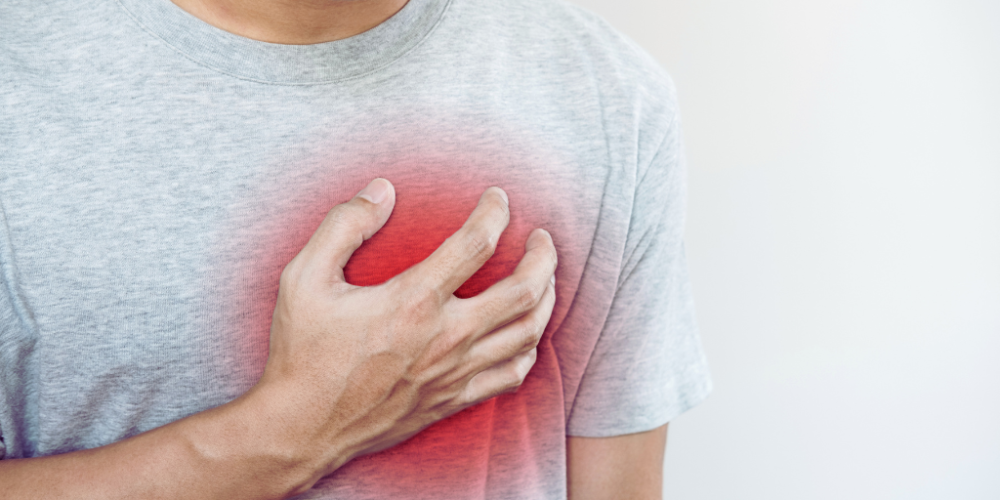6. You’re Always Tired

Profound, bone-deep fatigue that isn’t relieved by rest is a major symptom. To cope with its reduced pumping ability, your body makes a smart but taxing decision: it diverts blood flow away from less critical areas, like your muscles in your limbs, and prioritizes sending it to vital organs like the brain and the heart itself. The result? Your muscles are starved of the oxygen and nutrients they need, leaving you feeling weak, heavy, and constantly exhausted, even after a full night’s sleep.
5. You Have an Increased Heart Rate or Palpitations

Do you ever feel your heart racing, fluttering, or skipping beats? These sensations are known as palpitations. As Dr. Marah explains, “When the heart isn’t pumping enough blood, the body attempts to compensate by speeding up the heart rate to keep oxygen and nutrients flowing.” Your heart is literally working overtime to make up for its lack of efficiency. This extra strain can lead to these irregular or extra beats, which often become more frequent as the condition worsens.
4. You Have to Urinate More Often, Especially at Night

This is a tricky symptom that’s often blamed on aging or drinking too much water before bed. But it can be directly related to heart failure. During the day, when you’re upright, your struggling heart and kidneys cause fluid to pool in your legs. When you lie down at night, that retained fluid finally makes its way back into your bloodstream and gets filtered by your kidneys, which then produce a large amount of urine. This is why you find yourself waking up multiple times throughout the night to use the bathroom.
3. You Feel Nauseous or Have No Appetite

Just as your body diverts blood away from your limb muscles, it also reduces flow to your digestive system. Your gut is considered less vital than your brain in a crisis. With less blood flow, your entire digestive process slows down. This can lead to a feeling of being full even when you haven’t eaten much, a general lack of appetite, indigestion, and even nausea. It’s your body’s way of telling you that it’s conserving all available resources for the most critical functions.
2. You’re Often Lightheaded or Confused

Even though the brain is a priority organ, severe heart failure can affect it, too. If your heart’s output is significantly low, or if you have circulation problems, not enough oxygen-rich blood may be reaching your head. This can cause symptoms like dizziness, lightheadedness, confusion, or difficulty concentrating. You might feel disoriented or find your memory isn’t as sharp as it used to be. In extreme cases, it can even lead to fainting.
1. Your Hands and Feet Are Always Cold

Are you constantly wearing fuzzy socks and gloves, even when it’s not that cold? This can be another sign of poor circulation. As your body diverts warm, oxygenated blood toward your core and vital organs, it leaves your extremities—your hands and feet—literally out in the cold. On its own, this symptom isn’t a major cause for concern, as many people naturally have colder hands and feet. However, when you experience it in combination with several other signs on this list, it helps paint a bigger picture of a potential circulation issue stemming from your heart.
What To Do Next

Reading this list can be scary, but knowledge is power. The most important thing you can do is listen to your body and not dismiss these signs. While there is no permanent cure for heart failure, Dr. Marah emphasizes that “the condition can be treated and managed, often very successfully.” Many people live full, active lives with a combination of medications, lifestyle changes, and sometimes medical devices or procedures.
If you are experiencing new or worsening shortness of breath, rapid weight gain, significant swelling, or heart palpitations, you should make an appointment with your doctor as soon as possible. These are early warning signs that need to be investigated.
However, some symptoms require immediate emergency care. If you are struggling to breathe to the point where you can’t speak in full sentences, have chest pain, feel confused or lethargic, or have very low blood pressure, you need to call 911 or get to an emergency room right away. When it comes to your heart, it is always better to be safe than sorry. Taking action today can protect your health for years to come.

